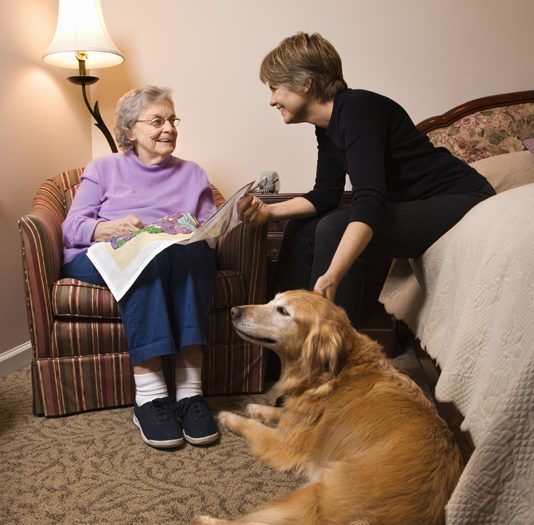By Kimberly Martinez
What should you pay attention to when choosing a companion for your golden years? It pretty much comes down to three basic things:
1. Size,
2. Energy level, and
3. Health and temperate history
Throughout centuries “man’s best friend” has been reserved as a title for canine companions. But as time progresses and we start to age, the demands of caring for “man’s best friend” can be too much for certain people.
Should that mean that we give up on dogs completely? No. It means it’s time to find a dog which suits your current lifestyle.
Size means a lot because there will be times you have to physically deal with your dog. From your everyday walk to giving him the affection he needs, physically dealing with a heavier dog may become progressively more difficult. Because of this, size is something you should consider. If you’re living with someone, bigger may be manageable, but if you are alone a smaller dog is probably best.
Now, some people automatically assume that if you get a smaller dog it will be less work, but guess what? That’s definitely not true. Most of my life I have had smaller dogs and for the most part, they were easy to handle until my Jack Russell, little “Geronimo.” And let me tell you, his energy is through the roof. I constantly have to be checking on him and making sure he is letting out his stored energy safely, which isn’t always easy. He is living proof that smaller doesn’t mean easier. But if you think you can deal with high energy no matter what then don’t be afraid. You know yourself and what you will be capable of handling.
Lastly, and maybe most importantly, is your dog’s health and temperate history. Most people hitting their senior years are on a fixed income while some are living off of their retirement. Why does this matter? Because some dogs are prone to diseases which means having to pay vet bills. If you are low on money, this will eventually put you between a rock and a hard place.
When deciding on a dog, make sure you ask about prior health history, along with health concerns about that specific breed. One suggestion that may help you is to get a dog who is already an adult. This will help you determine health history along with temper. Temper will become especially important, especially if you have younger kids around.
If you want to go the route of a puppy, mix breeds are best when it comes to health history. Mix breeds tend to have less problems physically than pure breeds because their genes aren’t derived from just one breed.
After asking 91 people, a study by Peter O Peretti of Kennedy King College found that 75 percent of males and 65 percent of females mentioned that their dog was their only friend. This shows that many older people saw having their dog as something worth mentioning just as others felt their children were worth mentioning.
One study even found that animal companionship is conducive to higher survival rates in coronary disease. In patients who had recently suffered from a heart attack, the mortality rate among people with pets was one-third that of patients without animal companionship.
Although the above pointers are simple, they could potentially help lead you to a healthier life. If you follow these suggestions, finding your best friend should come easy. Don’t let fear drive you away. There is a companion for everyone, you just have to take the time to find the best companion for you!
“Animals are INCREDIBLY wonderful companions for elder individuals and can do amazing things so far as enhancing and lengthening their lives. So much so that housing laws make special exceptions to prevent landlords from enforcing “no pets” policies when it comes to people, like many elderly, who have companion animals. Although clearly, no person should obtain a pet they are physically unable to control. The rewards can far outweigh some of the routine inconveniences.” -Bella J. Bristow
Sources
Curit, Rachel. “Benefits of Animal Companionship.” Onegreenplanet.org. N.p., 08 Aug. 2014. Web. 26 Oct. 2015.
Peretti, Peter O. “Elderly-Animal Friendship Bond.” Social Behavior and Personality (n.d.): n. pag. Academic Search Complete [EBSCO]. Web. 26 Oct. 2015.
Editors: Lisa Caprelli and Zara Safdar








No comments yet.